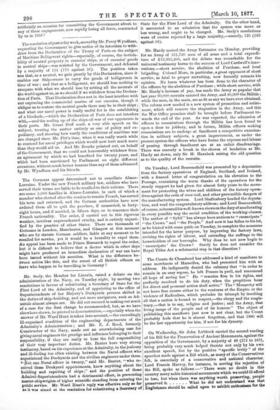The resolution of yesterday week, moved by Mr. Percy Wyndham,
requesting the Government to give notice of its intention to-with- draw from the Declaration of the Treaty of Paris on the subject of Maritime Belligerent rights—especially, of course, the inviola- bility of neutral property in enemies' ships, or of enemies' goods in neutral ships—was resisted by the Government, and defeated by a majority of 114 (170 against 56). The position taken was that, as a neutral, we gain greatly by this Declaration, since it enables our Shipowners to carry the goods of belligerents in time of war ; and that as a belligerent, we should lose nothing to compare with what we should lose by setting all the neutrals of the world against us, as we should if we withdrew from the Declara- tion of Paris. That Declaration does not in the least interfere with our capturing the commercial marine of our enemies, though it obliges us to restore the neutral goods there may be in their ships ; and what our naval power is really useful for is the establishing of a blockade,—which the Declaration of Paris does not interfere with,—and the sealing up of the ships-of-war of our opponents in their ports. Mr. Grant Duff made a very able speech on the
subject, treating the matter entirely as one of policy and ex- pediency, and showing how vastly the conditions of maritime war are changed since Mr. Pitt's time, when it was really worth while to contend for naval privileges which would now hurt much more than they would aid us. And Mr. Bourke pointed out, on behalf of the Government, that we could not honourably withdraw from an agreement by which we had benefited for twenty years, and which had been sanctioned by Parliament on eight different occasions, without much better reasons than any of those advanced by Mr. Wyndham and his friends.


































 Previous page
Previous page